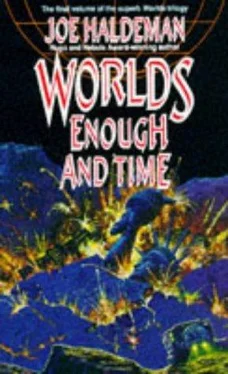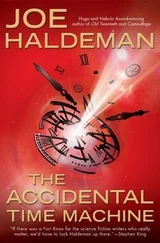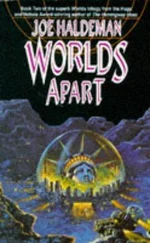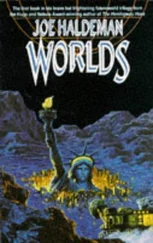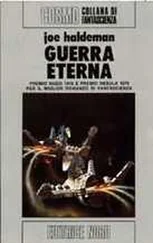I was surprised that there were no other real incidents. I’d warned Christensen that the three-to-six shift was likely to be eventful, but maybe he’ll have it easy, too. By three o’clock most of the diehards were sober people, just too adrenalized to sleep, sitting around in clusters singing or telling tales.
I had a vision of groundhogs doing this thousands of years ago—hanging around Stonehenge after the midnight ceremony, tossing more wood on the campfires, passing the mead, and telling ghost stories until dawn. I was probably the only person there who had ever actually smelled a campfire; felt the welcome heat with the cold autumn night at your back.
Just before three, I ran into Charlee Boyle (her real name is Charity Lee, which she hates), who offered to split a small bottle of boo with me, my first drink of the night. I shouted us a half-liter of orange juice, which pretty well masks the industrial-solvent flavor.
It has had the desired effect. G’night, Prime. Wake me up at ten till six. (Notes dictated about 3:45; will clean them up on the keyboard later.)
4. FROM EACH ACCORDING TO HIS INCLINATIONS
The next day, Tuesday, was long and tiring. People showed up late or not at all, as O’Hara had predicted. Most of them saw no need for urgency, her timetable notwithstanding—if something wasn’t picked up today, it would still be there tomorrow.
But tomorrow was exactly what O’Hara was worried about. There was going to be another anniversary celebration, less raucous, when greetings were beamed from New New. She had to have bleachers in place in front of the large screen, the area reasonably neat; coffee and tea facilities for a couple of thousand. It’s true that tomorrow everybody could just look up and watch the thing on home or office screens, but any kind of break in the routine was always welcome.
It was an interesting exercise in leadership for O’Hara. She had asked to borrow 145 “GP auxiliaries” from various departments, but they didn’t come equipped with supervisors. So by 8:30—half an hour late—she found herself surrounded by about 110 men and women standing around with their hands in their pockets, staring at her and each other. She was an admiral in a sea of privates. Most knew who she was, but she didn’t have much authority in their eyes.
Rather than try to find out who everyone was and what they supposedly could do best, she divided them at random into two roughly equal groups: one bunch, the pickup crew, she lined up from one side of the park to the other and sent marching off, studying the ground, picking up litter and passing it to recycle bags. The second group stayed with her and assembled bleachers. Then they took them apart and did them over, more or less right.
A hundred motivated people could have finished everything before lunch. This group worked, if you could call it that, until three or four. After they were gone, O’Hara and her regular crew spent another hour tightening bolts and policing up tools and bags.
It’s a problem she had discussed with Purcell, who made the obvious analogy with early European communist states, like the Soviet Union before it became the SSU. Minimum labor yielded the same result as maximum, for people who measured success in terms of material rewards. Anyone who did more work than was absolutely necessary was either an idiot or a toady.
In New New you could buy exotic food and drink, imported from Earth. ‘Home’s luxuries were less exciting, but followed the same principle: fancy pastries, odd liqueurs and candies, or just extra wine and beer. You could buy services of a personal nature, sex or massage or a private portrait or concert, but paying often required an elaborate system of transferrable IOU’s, since nobody’s card could hold more than $99.99.
O’Hara instituted a system of rewards that many other departments copied. On the last day of each month, she named one of her people “Worker of the Month,” and in addition to a public pat on the back, he or she was given access to $200 in a departmental “bonus account.” Two hundred dollars would throw a pretty riotous small party, and that’s what most people did with their reward. It was a mild kind of capitalism, transmuting diligence at the workplace into a boost in social status.
Otherwise, O’Hara made the same three dollars per hour that her GP’s did; if you could drink an extra cup of coffee every twenty minutes, you could stay broke. So everyday life was pretty unchallenging. Until 9:02 in the morning, 23 September 2098.
5. IN THE DEAD VAST AND MIDDLE OF THE NIGHT
24 September 2098 [2 Chang 293]—Midnight. I have started this entry a dozen times. Write a sentence or two and erase it. Most of the time I sit and stare at the empty screen. Nothing I write seems adequate for this.
There is no word for this feeling. No one word. Desolation. That has a good sturdy ring to it. What the hell are we going to do?
Might as well just pick the thing up where I left off, and, keep typing.
People started to drift in for the anniversary broadcast about 7:30. New New had produced a documentary program about the construction of ’Home, interesting enough. Almost three thousand people turned up eventually, filling the bleachers and packing the space around them.
Sandra Berrigan gave a nice short speech, wishing us well, and then they projected an old-fashioned clock face behind her, to tick off the last fifteen seconds, New Year’s Eve style. The crowd behind the camera began to chant five, four, three, two—and then (we’ve played this back many times) Sandra suddenly looks to her right and raises her arm, starting to point at something. And then the screen goes white, and stays white.
We’ve lost New New. We’ve lost Earth.
It took the technicians about one minute to find out how much worse it was even than that. The last signal from New New was an active intelligent sabotage program. It slammed into our information systems and, before it could be contained, randomized most of our stored information, and backups, in discrete chunks. All of Hamlet , for instance, is lost. All of The Tempest and the Henry plays: Macbeth, Romeo and Juliet . But Twelfth Night is intact. Troilus and Cressida . It’s perverse.
Ninety percent of history and art and philosophy are gone. But what may kill us is the missing science, mathematics, and engineering. If something goes wrong with the antimatter containment, for instance, we’ll just have to roll up our sleeves and try to figure it out from scratch before it quietly blows everyone to Kingdom Come.
We don’t even know whether New New still exists. There’s nothing wrong with our antennas; we can still monitor the radio telescope on the Moon, the useless navigation beacons in Earth’s oceans. But not so much as a carrier wave from New New. Our telescopes aren’t quite powerful enough to see it. Seeing it wouldn’t mean there was anybody alive inside, anyhow.
I think I know now, a little, how Harry felt the day the doctor told him he was going to die. Not today, probably not tomorrow, but soon enough.
They had two months in which to make the big decision. Up to fourteen months out, they still had the option of turning around, decelerating for another fourteen months, and then slowly returning to Earth and New New. After 25 November, their bridges would be burned: Epsilon, or slow death, or swift.
Room 4004 felt too small for the whole thirty-six-person Cabinet—normally Engineering and Policy met in camera separately, only getting together for largely ceremonial public sessions—but they did manage to find enough chairs and places to put them. O’Hara and John Ogelby were the last ones in. The security door sighed shut behind them, and the murmur of conversation ebbed to claustrophobic silence.
Читать дальше
